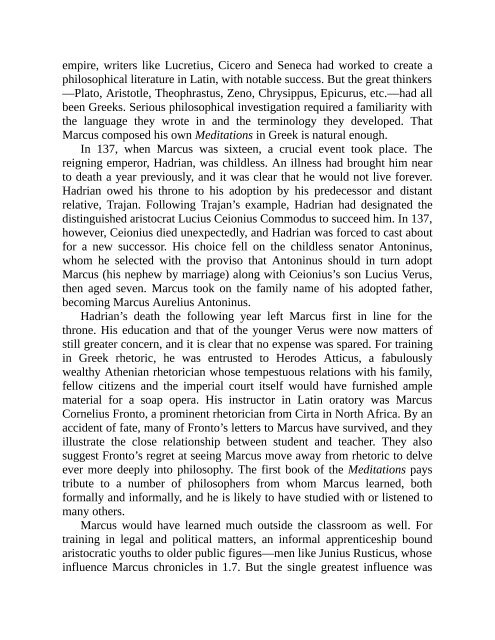9781945186240
Create successful ePaper yourself
Turn your PDF publications into a flip-book with our unique Google optimized e-Paper software.
empire, writers like Lucretius, Cicero and Seneca had worked to create a<br />
philosophical literature in Latin, with notable success. But the great thinkers<br />
—Plato, Aristotle, Theophrastus, Zeno, Chrysippus, Epicurus, etc.—had all<br />
been Greeks. Serious philosophical investigation required a familiarity with<br />
the language they wrote in and the terminology they developed. That<br />
Marcus composed his own Meditations in Greek is natural enough.<br />
In 137, when Marcus was sixteen, a crucial event took place. The<br />
reigning emperor, Hadrian, was childless. An illness had brought him near<br />
to death a year previously, and it was clear that he would not live forever.<br />
Hadrian owed his throne to his adoption by his predecessor and distant<br />
relative, Trajan. Following Trajan’s example, Hadrian had designated the<br />
distinguished aristocrat Lucius Ceionius Commodus to succeed him. In 137,<br />
however, Ceionius died unexpectedly, and Hadrian was forced to cast about<br />
for a new successor. His choice fell on the childless senator Antoninus,<br />
whom he selected with the proviso that Antoninus should in turn adopt<br />
Marcus (his nephew by marriage) along with Ceionius’s son Lucius Verus,<br />
then aged seven. Marcus took on the family name of his adopted father,<br />
becoming Marcus Aurelius Antoninus.<br />
Hadrian’s death the following year left Marcus first in line for the<br />
throne. His education and that of the younger Verus were now matters of<br />
still greater concern, and it is clear that no expense was spared. For training<br />
in Greek rhetoric, he was entrusted to Herodes Atticus, a fabulously<br />
wealthy Athenian rhetorician whose tempestuous relations with his family,<br />
fellow citizens and the imperial court itself would have furnished ample<br />
material for a soap opera. His instructor in Latin oratory was Marcus<br />
Cornelius Fronto, a prominent rhetorician from Cirta in North Africa. By an<br />
accident of fate, many of Fronto’s letters to Marcus have survived, and they<br />
illustrate the close relationship between student and teacher. They also<br />
suggest Fronto’s regret at seeing Marcus move away from rhetoric to delve<br />
ever more deeply into philosophy. The first book of the Meditations pays<br />
tribute to a number of philosophers from whom Marcus learned, both<br />
formally and informally, and he is likely to have studied with or listened to<br />
many others.<br />
Marcus would have learned much outside the classroom as well. For<br />
training in legal and political matters, an informal apprenticeship bound<br />
aristocratic youths to older public figures—men like Junius Rusticus, whose<br />
influence Marcus chronicles in 1.7. But the single greatest influence was


